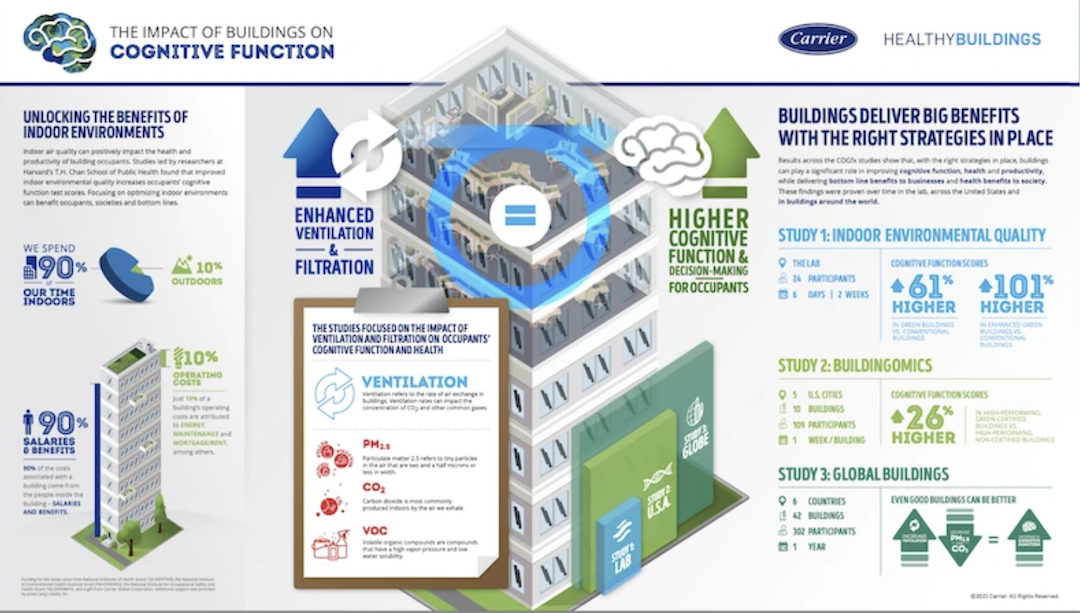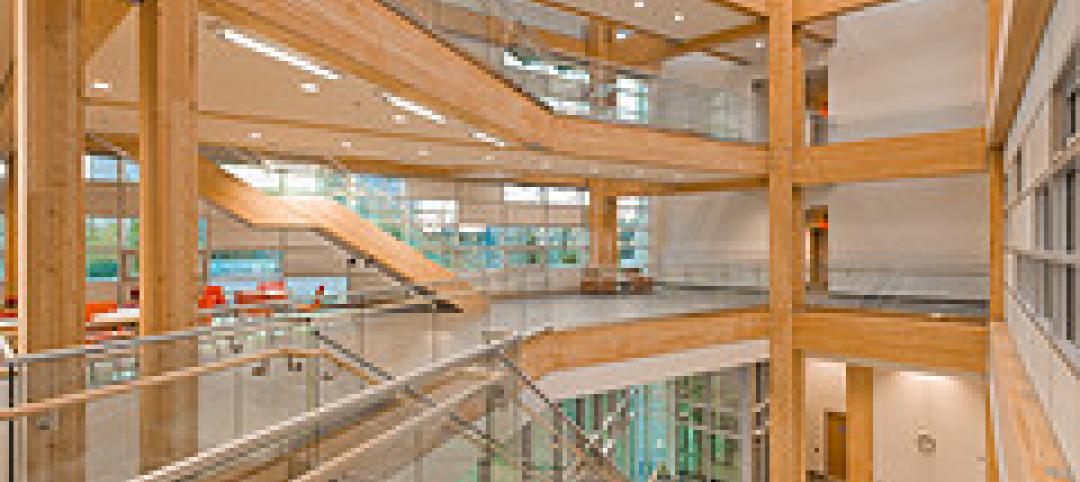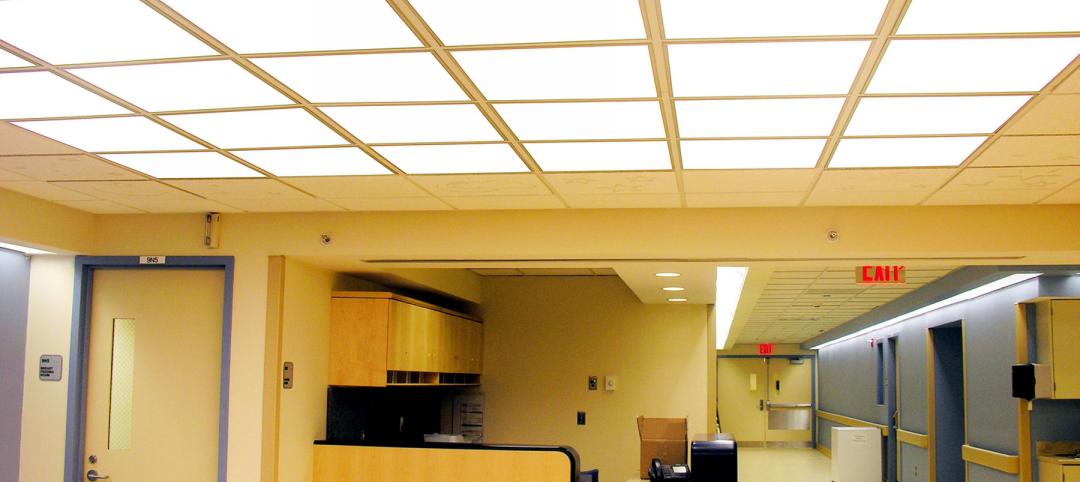Enhanced ventilation and filtration can improve the cognitive function and health of a building’s occupants, and should be the preeminent strategy for healthy buildings.
That’s the conclusion of COGfx Study 3: Global Buildings, new research by the Harvard T.H. Chan School of Global Health, which has been investigating the relationship between indoor air quality and cognitive performance since 2014. The latest study is the first to take a global approach, encompassing 302 office workers in 42 buildings across 30 cities and six countries—China, India, Mexico, Thailand, the United Kingdom, and the U.S.
This study builds upon and corroborates two previous research projects that the T.H. Chan School had conducted over the past several years. The first tested 24 lab workers for six days over two weeks and found 61% higher cognitive scores among those in green vs. conventional buildings, and 100% higher scores in enhanced green buildings. The second tested 109 participants in 10 buildings and five U.S. cities over a week’s time, and recorded 26% higher cognitive scores among those people in green-certified buildings vs. high-performance but non-certified buildings.
The latest, more expansive, study tracked occupant performance over 12 months. The study concluded that occupants’ cognitive function improves by increasing a building’s ventilation (i.e., the rate of air exchange) in ways that reduce its interior inhalable particulates (PM2.5 specifically) and carbon dioxide (CO2)
The third study, whose findings were released last week, used real-time environmental sensors (including wearable monitors) and a customized Harvard Healthy Buildings mobile app to collect data and administer momentary assessments of cognitive function, health, and occupant satisfaction.
IAQ IS NOW CRITICAL TO INTERIOR DESIGN
Even small effects of cognitive function and health can translate into substantive short- and long-term benefits, the study reports. “When you consider that 90% of the costs in a building are associated with the people inside, including salaries and benefits, the ability to improve cognitive performance and reduce infectious disease transmission, sick building symptoms, and missed workdays through improved air quality is powerful.”
As more people return to their workplaces and schools after prolonged pandemic quarantines, “the health, safety, and intelligence of indoor environments have come into greater focus,” says Dave Gitlin, Chairman and CEO of Carrier, the HVAC supplier which provided a gift to help fund this research. “The COGfx Study continues to demonstrate that proper ventilation and filtration of indoor environments play important roles across the globe in fostering a proactive health strategy.”
Carrier’s Healthy Buildings Program, which serves several typologies, offers innovations that include a digital, cloud-native platform for aggregating data from different systems and sensors; OptiClean, a portable negative air machine; and Indoor Air Quality assessments for devising health building strategies.
Funding for the Harvard study also came from the National Institutes of Health, the National Institute of Environmental Health Sciences, and the National Institute for Occupational Safety and Health. JLL provided additional support.
Related Stories
| Nov 18, 2011
Centre for Interactive Research on Sustainability opens
Designed to exceed LEED Platinum, the Centre for Interactive Research on Sustainability (CIRS) is one of the most innovative and high performance buildings in North America today, demonstrating leading-edge green building design products, technologies, and systems.
| Nov 15, 2011
Miller joins Perkins Eastman as regional manager, Middle East and Northern Africa
Miller joins Perkins Eastman with more than 48 years of experience in architecture, design management, and construction administration for planning and infrastructure.
| Nov 2, 2011
Alexandria Real Estate Equities, Inc. breaks ground on Alexandria Center in Cambridge, Mass.
307,000-sf building to be house to executive offices of Biogen Idec.
| Oct 25, 2011
MKK participates in BSA Engineering Merit Badge day
MKK principal Craig Watts attended the event as a representative of the MEP (mechanical/electrical/plumbing) engineering industry to give scouts an idea of what’s involved in becoming a mechanical engineer, and an overview of a typical day in the life of an engineer.
| Oct 20, 2011
Stellar hires Navy veteran Taylor as vice president
Stellar’s federal experience includes military exchanges (large retail stores on military bases), lodging facilities for military personnel, fuel stations, youth activities centers and recreational centers.
| Oct 12, 2011
FMI’s Construction Outlook: Third Quarter 2011 Report
Construction Market Forecast: The general economy is seeing mixed signs.
| Oct 11, 2011
Pink light bulbs donated to Society of Memorial Sloan-Kettering Cancer Center
For every Bulbrite Pink Light Bulb that is purchased through the Cancer Center Thrift Shop, 100% of the proceeds will be donated to help support breast cancer research, education, screening, and treatment.
| Sep 26, 2011
Energy efficient LED flat panels installed at N.Y. metro hospitals
LED Flat Panels deliver fully dimmable, energy efficient high quality lighting with even, shadow-free distribution, and excellent 85 Color Rendering Index.
| Sep 12, 2011
Geist opens European branch
The new branch provides the company’s international clients with additional support and services.
| Apr 13, 2011
Danfoss Chairman of the Board Joins Clinton Global Initiative
Danfoss, a leading manufacturer of high-efficiency electronic and mechanical components and controls for air-conditioning, heating, refrigeration and motion systems, today announced that Jorgen M. Clausen, Chairman of the Board, has received and accepted a membership from former President Bill Clinton to join the Clinton Global Initiative.















